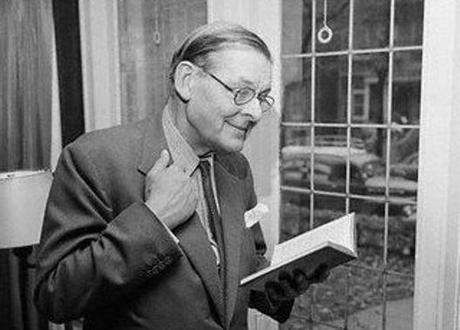Well, that covers a multitude of sins. Where do you start? Voting systems, conspiracy theories, railway timetables (excluding Northern Rail as it's on another planet where train crews don't exist), manifestos, VAR, bank balances, Preston North End switching an agreed end for penalties in the Championship play-off against Birmingham City on the 17th May 2001.
All of the above, but as this is a poetry-based blog, let's stick to one thing which really does qualify as a travesty. It first came to my notice about ten years ago when I came across a CD of T. S. Eliot's The Four Quartets read by Ralph Fiennes. My delightful LP of Eliot reading his own work was scratched and worn so I purchased this update with some enthusiasm. I managed about two minutes of it when I got home.

T S Eliot reading
Then in 2012 I tuned into the BBC for a reading of The Wasteland by Jeremy Irons and Eileen Atkins. I seem to remember recoiling in a mixture of horror and laughter. I'm not sure about Atkins, but Jeremy wasn't reading but performing.That was when I started to notice that there is a difference between poets reading poetry and actors reading poetry. Someone else has noticed this as well because I came across a phrase that sums up that difference. This person (and I can't find their name, damn it) said "Actors read vowels and poets read consonants." Another way of looking at it is that vowels are the emotion and consonants are the intellect. Consonants can only be spoken in one way and so make speech hard and crisp but vowels can be pronounced in many ways. Thus with consonants there is a concentration on the words being spoken but with vowels their open-ended nature gives rise to you listening to the pronunciation, the rise and fall of the voice, and away from the meaning of the poem.
Listen to the radio or recordings of poetry and you'll find that most of them are read by actors. They are being paid. I am a member of the Poetry Society which exists...to create a central position for poetry in the arts and continue to build new avenues to promote poets and poetry in Britain today. I know it is not a Trades Union, but I don't see any actions that would create opportunities for poets to earn a living by doing what they would do best: Read Poetry.
I'll finish on a positive note. If you want to hear a poem read well then I'd point you at Alice Oswald reading her own work Dart. It's available on CD and here is an excerpt:
Who's this moving alive over the moor?
An old man seeking and finding a difficulty.
Has he remembered his compass his spare socks
does he fully intend going in over his knees off the military track from Okehampton?
keeping his course through the swamp spaces
and pulling the distance around his shoulders
and if it rains, if it thunders suddenly
where will he shelter looking round
and all that lies to hand is his own bones?
(from Dart by Alice Oswald, 2010)
Terry Quinn Email ThisBlogThis!Share to TwitterShare to Facebook
Reactions:
